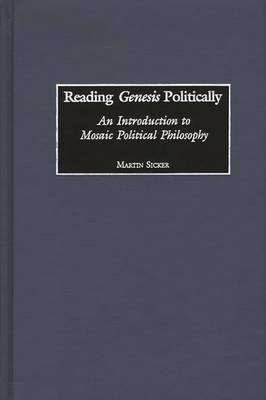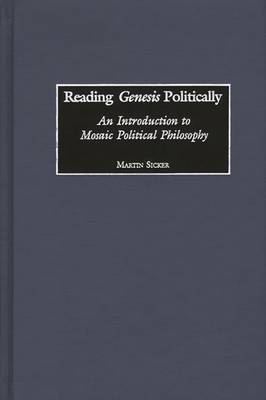
- Retrait gratuit dans votre magasin Club
- 7.000.000 titres dans notre catalogue
- Payer en toute sécurité
- Toujours un magasin près de chez vous
- Retrait gratuit dans votre magasin Club
- 7.000.000 titres dans notre catalogue
- Payer en toute sécurité
- Toujours un magasin près de chez vous
Reading Genesis Politically
An Introduction to Mosaic Political Philosophy
Martin Sicker
Livre relié | Anglais
186,95 €
+ 373 points
Description
Sicker asserts that the Mosaic canon, the Pentateuch, is first and foremost a library of essentially political teachings and documents, and that the first eleven chapters of the book of Genesis set forth in essence a general Mosaic political philosophy. These writings take a unique mythopoeic approach to the construction of a normative political theory intended to undergird the idea of a mutual covenant between God and the people of Israel that is to be realized in history in the creation of the ideal society. It is with the elaboration of the political ideas reflected in these early chapters of Genesis that this book is concerned.
For the modern reader, the biblical texts should be understood as postulating some basic ideas of Mosaic moral and political philosophy that, in Sicker's view, continue to be applicable in contemporary times. First, man is endowed with free will, however constrained by circumstances it may be, and with the intellect to govern and direct it in appropriate paths. Accordingly, he is individually responsible for his actions and must be held accountable for them. Second, man has a necessary relation to God whether he wishes it or not. Prudence alone will therefore dictate that compliance with divine precept is in man's best interest. Third, the notion that man can create a moral society without reference to God is a deceptive illusion. Man's ability to rationalize even his most outrageous behavior clearly indicates the need for an unimpeachable source and standard of moral authority. Fourth, until all men accept the preceding principles, the idea of a universal state is both dangerous and counterproductive. In the 20th century, we have witnessed two different attempts to create such a world state, both of which produced totalitarian monstrosities. Fifth, individualism as a social philosophy tends to be destructive of traditional values and must be tempered by the idea of communal responsibility. A survey of particular interest to scholars, researchers, and students interested in Jewish history, political thought, and the Old Testament.Spécifications
Parties prenantes
- Auteur(s) :
- Editeur:
Contenu
- Nombre de pages :
- 176
- Langue:
- Anglais
Caractéristiques
- EAN:
- 9780275974930
- Date de parution :
- 28-02-02
- Format:
- Livre relié
- Format numérique:
- Genaaid
- Dimensions :
- 161 mm x 243 mm
- Poids :
- 408 g







